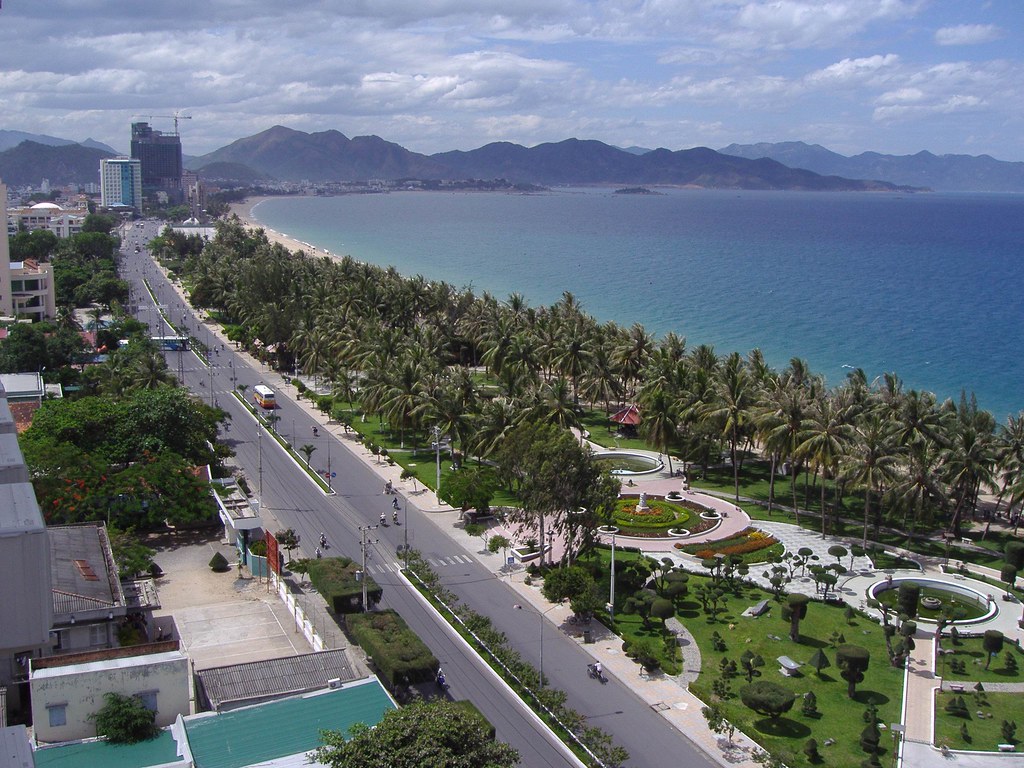10 Top Tourist Attractions in Vietnam
Most travelers to Vietnam are attracted by the country’s wonderful natural beauty: From the green rice fields in the north to the fascinating bustle of the Mekong Delta in the south. Vietnam however is also a country with a long history and ancient traditions. It has many historic attractions and old temples. An overview of the most amazing tourist attractions in Vietnam.
10Nha Trang
 flickr/NguyenTrung
flickr/NguyenTrung
Nha Trang is Vietnam’s most popular seaside resort town located along the second most beautiful bays in the country. It features beautiful beaches with fine and clean sand and clear ocean water with mild temperatures. The city has about 300,000 inhabitants and is more lively and urban in character than other beach destinations like Mui Ne and Phu Quoc. It’s also the scuba diving center of Vietnam.
Cu Chi Tunnels
 flickr/eroku
flickr/eroku
The Cu Chi Tunnels are an immense network of connecting underground tunnels located about 40 km northwest of Ho Chi Minh City (Saigon). The tunnels were used by Viet Cong guerrillas as hiding spots during the Vietnam War, and were the base of operations for the Tết Offensive in 1968. The tunnels have become a popular tourist attraction, and visitors are invited to crawl around in the safer parts of the tunnel system.
Mekong Delta
 flickr/jorgecab
flickr/jorgecab
The Mekong Delta is the region in southern Vietnam where the Mekong River approaches and empties into the sea. It is a very rich and lush area, covered with rice fields, that produces about half of the total of Vietnam’s agricultural output. Subsequently, life in the Mekong Delta revolves much around the river, and all the villages are often accessible by river rather than by road.
7Mui Ne

The formerly little-inhabited beach south of the fishing village of Mui Ne has seen some serious development in the last 15 years. Due to strong sea breezes it is a popular destination in Vietnam for kite- and windsurfing. No trip to Mui Ne is complete without a trip to the famous sand dunes located a short distance north of the town. The vast sandy expanse provide some great panoramic views especially during sunset.
See Also: Where to Stay in Mui Ne
6Sa Pa Terraces

Sa Pa is a town in northwest Vietnam not far from the Chinese border. Rice terraces can be found in the Muong Hoa valley between Sa Pa town and the Fansipan Mountain, on a backdrop of thick bamboo woodlands. Local mountain people, the Hmong, Giay, Dao, Tay, and Giay, grow rice and corn on these paddy terraces, along with vegetables.
5Phu Quoc

Located in front of the Cambodia coast, Phu Quoc is the largest island in Vietnam. Phu Quoc is what Phuket would be if it hadn’t been overrun by development. The island features pristine tropical forests, undamaged coral reefs and great beaches. One of its beaches, named Bai Dai (Long Beach), was chosen by the ABC News as one of five beautiful and clean beaches. Phu Quoc is famous for producing the best nuoc mam or fermented fish sauce in the world.
See Also: Where to Stay in Phu Quoc
4Hoi An
 flickr/jmhullot
flickr/jmhullot
This fishing-village-turned-tourist-attraction is situated on the coast of the South China Sea. Hoi An has been an international port from the 16th century although the serious shipping business has long since moved to the city of Da Nang. The heart of the city is still the Old Town, full of winding lanes and Chinese-styled shops. It is sometimes called the “Venice of Vietnam” because of the narrow canals that cut through part of the town.
3Hoan Kiem Lake (Hanoi)

Located in the historical center of Hanoi, Hoan Kiem Lake is one of the major scenic spots in the city and serves as the locals’ favorite leisure spot. Hoan Kiem means “returned sword”, and the name comes from a legend in which King Le Loi was given a magical sword by the gods, which he used to drive out the invading Chinese. Later he returned the sword to the Golden Turtle God in the lake.
Thien Mu Pagoda (Hue)

With seven stories, the Thien Mu Pagoda in Hue is the tallest pagoda in Vietnam. The pagoda overlooks the Perfume River and is regarded as the unofficial symbol of the former imperial capital. The temple was built in 1601 during the rule of the Nguyễn Lords. The initial temple was very simply constructed, but over time it was redeveloped and expanded with more intricate features.
See Also: Where to Stay in Hue
1Ha Long Bay

Ha Long Bay is situated in north Vietnam round a 120 kilometer long coast line and is literally translated as “Bay of Descending Dragons”. The top tourist attraction in Vietnam, Ha Long Bay features thousands of islands, each topped with thick jungle vegetation, forming a spectacular seascape of limestone pillars. Several of the islands are hollow, with enormous caves, others islands include lakes and some support floating villages of fishermen.

إرسال تعليق